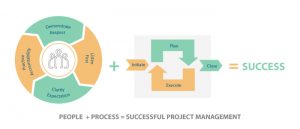C-SUITE PROJECT MANAGEMENT LEADERSHIP
€495

Turn your organisations project management capabilities into a competitive advantage. Whether you are in charge of a team, a department or at enterprise, leadership level, leadership skills are absolutely essential. to sustaining profitable business change. Executive Project Leadership calls for clear communication about goals, responsibility, performance, change management, strategic thinking, expectations and feedback. Our project leadership training offers training for all levels of experience from the aspiring leader to the executive at the c-suite level.

Executives tend to focus on business goals, project results and return on investment. Project management practitioners focus on tactics, processes, tools, techniques and deliverables. Each profession needs to understand there is a difference between project success and business success:
The Standish Group has been publishing their annual CHAOS report for the past 28 years. The highlight of this report, for many, is the factors which materially influence both the success and failure of (IT) projects.
Since the very first CHAOS report in 1994, the respondents of the survey have consistently ranked user involvement and executive management support as the two top reasons for project success. Conversely, in the latest version of the report (2020), The lack of executive support has been ranked as the fourth most common reason for challenged projects and fifth most common reason for impaired/failed projects. Some of the other factors that can be attributed to executives which ranked in the top ten of both challenged and impaired/failed projects include: factors that can be attributed to executives which ranked in the top ten of both challenged and impaired/failed projects include:
- Changing requirements and specifications
- Unrealistic expectations
- Unclear objectives
While the Standish Group’s research focuses on IT projects, research has recognised similar trends across several industries over the past five years, including: information technology, healthcare, engineering, mining, hospitality, construction and retail projects.
Leadership Executives Outline a Set of Factors Attributed to Project Success Outcomes:
- Established the goal
- Project success definition (3 levels)
- Clear and measurable criteria for project delivery – product / service – business value success
- Communication and stakeholder engagement
- Requirements management
- Planning
- Leadership
- Team management
- Risk management
- Project control and governance
Successful projects demand strong commercial leadership from executives and c-suite level management team.Leadership skills are perhaps the greatest determinant of project success.
WHAT ARE THE DELIVERABLES FROM THE EXECUTIVE PROJECT LEADERSHIP WORKSHOP?
- Role of Executive Project Leadership and Sponsorship
- Focus on Delivering Value
- Selecting and Prioritizing Projects
- Benefits and ROI on Projects
- Rationale and Business Case
- Scope Creep & Value Creep
- Applying the Project Canvas
- Key Success Factors
- Agile and Project-Driven Organisation Building Project Success
- Challenges -Internal Roadblocks,Knowing-Doing Gap & Implementation
- Understanding Project Success and Failures
- Executive Project Leadership Roadmap – Actions
Available on Request
Dublin – London
9am – 1pm
Description
“To understand the importance of project management today and in the future, we must recognise that project management today and most likely will continue to be in the future, a critical component of a firms business model because it is the delivery system for long term sustainable business value” – Harold Kerzner 2019
Turn your organisations project management capabilities into a competitive advantage. Whether you are in charge of a team, a department or at enterprise, leadership level, leadership skills are absolutely essential. to sustaining profitable business change. C-Suite Project Management Leadership calls for clear communication about goals, responsibility, performance, change management, strategic thinking, expectations and feedback. The leader must have the ability to effectively negotiate and use persuasion when necessary to ensure the success of the team and project outcomes. Our project leadership training offers training for all levels of experience from the aspiring leader to the executive at the c-suite level.
The leadership style should be flexible,agile and innovative to deliver project success outcomes and the leader should emphasize on team building and motivation so that the divergent members can work together as a team.
- C-Suite executives deliver business goals and project results
- Leadership sponsorship and ownership
- Ensures every project supports the right business goals
- Linking all projects to the business strategy
- Managing sponsorship,resources and stakeholders across the project portfolio
- Adaptable Leadership style
What are the deliverables from the C-Suite Project Management Leadership Workshop?
- Role of C-Suite Project Management Leadership and Sponsorship
- Focus on Delivering Value
- Selecting and Prioritizing Projects
- Benefits and ROI on Projects
- Project Complexity Assessment
- Rationale and the Business Case
- Applying the Project Canvas
- Key Success Factors
- Agile and Project-Driven Organisation Building Project Success
- Challenges – Internal Roadblocks,Knowing-Doing Gap & Implementation
- Understanding Project Success and Failures
- C-Suite Project Management Leadership Roadmap – Actions
Additional Information
| Date: | 17 June 2020, 8 July 2020, 12 August 2020 |
|---|




